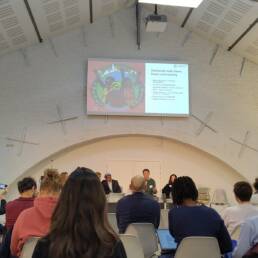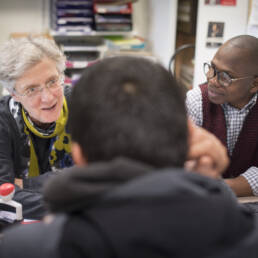Author
Lucy Anns
Policy and Advocacy Officer
Tel: +32 (0)2 235 26 59
lanns@caritas.eu
For Alexandra1, her family and community, the COVID-19 pandemic meant that there was no more work available. She and her family did not even dare to leave the Romani settlement they are living in for fear of being caught by the police without the proper documentation following the lockdown rules.
“Somebody tried to get to his land to work there but he was stopped by police and fined, since he had no papers.” When she and her community asked the mayor for help, he said that it was their problem, and they should find a solution themselves. Usually, during the summer, Alexandra’s family and others in her community work in Germany, harvesting cucumbers. However, due to border closure, nobody knew whether it would be possible. “They say we can get to Germany only by plane and we know already that those, who organise everything, will ask for much more money.” – Alexandra, a young mother in a Roma community in Northwestern Romania, visited by a Caritas team during the lockdown in spring 2020.
COVID-19 has turned our world upside down with the loss of loved ones, restrictions on many of our cherished freedoms in the name of health and safety, and separation from friends and family. It has also transformed the way we work, in some ways positively, such as increased flexibility through teleworking; but also negatively, limiting job opportunities and creating financial insecurity through temporary contracts, precarious and part-time jobs.
Although the socio-economic impact of the pandemic has been felt by everyone in all countries across the EU, it has been uneven for different age groups, sexes, nationalities/ethnicities, and categories of workers, with those hardest hit being women, young people, migrants, Roma, people with disabilities, older workers, irregular workers, care workers, and those working in non-standard forms of employment. For many migrant workers, especially care workers, the closure of borders left them stranded and the health risks associated with their front-line jobs meant they couldn’t continue working. Many younger workers lost their jobs and for those recently graduated, struggled to find new ones with increased competition from all those who had been laid-off. For Roma people, with fewer day jobs available and a lack of seasonal work due to border closures, it was difficult for many to make a living. For women, the closure of schools and childcare facilities meant that it was extremely difficult to maintain their jobs whilst looking after their children, even though this was intended to be a shared responsibility in many families. The reality was that the work typically fell to the women.
Not surprisingly, it is these same groups who were already facing severe challenges in the labour market prior to COVID-19 due to inadequate education, discrimination, unrecognised qualifications, and a shortage of care facilities to name a few. Gaps in labour market policies, legislative and policy failures over successive years, and shortages in political will to implement existing policies, have denied many the right to decent and well renumerated work.

This is a fundamental failing, and one which is prevalent across Europe. Decent work for all is an international human right2, a moral obligation, and a necessary priority for the good of society. It is a source of well-being, a means of social protection, and a space for personal growth. Work is about more than paying the bills; decent work invests in people’s knowledge, skills and creativity and allows them to create value, make decisions and shape their future and the future of their communities. Furthermore, decent work should not be confined to paid employment but embrace all socially useful activities such as unpaid care, household maintenance and community volunteering. Decent work provides a sense of purpose, and in so doing brings dignity, and if this is to be protected, then the basic rights of workers must be respected.
The pandemic has forced us to stop and reflect on the dignity and value found and created in work. Workers are much more than resources3. Never has that been clearer than with the front-line work of “essential workers”. With this reflection should also come a fundamental re-evaluation of what we consider to be truly decent work, its importance for society, as well as the contributions of all workers and occupations.
Beyond the COVID-19 pandemic, the rise of new technologies, demographic shifts and climate change are having further transformative effects on our economies and on work4. Major political and financial investments need to be prioritised in shaping the future of work in Europe in alignment with Agenda 2030 and the SDGs. Not only this, but European Member States must also acknowledge the role they play and will continue to play in shaping the labour markets and working conditions of other countries beyond their borders. All workers, regardless of their contractual arrangement or employment status, should enjoy fundamental workers’ rights, an adequate wage, maximum limits on working hours, and health and safety at work5. All Member States should therefore implement the EU’s policy initiatives in the European Pillar of Social Rights Action Plan in cooperation with social partners and civil society organisations, apply all international standards, and ratify all provisions of the Revised European Social Charter. The value and dignity of all types of work and of all workers must be recognised and respected in all areas, at all levels and by all stakeholders.
Notes
1. For the purposes of this article, the name was changed
2. Enshrined in Article 23 of the Universal Declaration of Human Rights (1948), and as Goal 8 of the UN’s 2030 Agenda (2015).
4. Work for a brighter future – Global Commission on the Future of Work (ilo.org)
5. Ibid.












